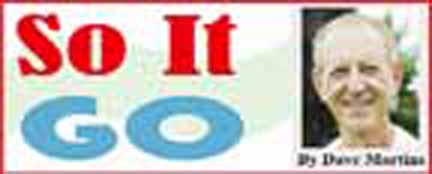 Of course, my not getting to know him is my fault. I’m always concerned, perhaps too much so, about being pushy; walking up to someone and introducing myself is not me. I’m getting better at it as I get older, but it’s still not me. So over the years, in all the times I’ve been here, I didn’t seek Martin out, and in the later years, when I did think about it, I knew his health was not good, and I didn’t want to trouble him.
Of course, my not getting to know him is my fault. I’m always concerned, perhaps too much so, about being pushy; walking up to someone and introducing myself is not me. I’m getting better at it as I get older, but it’s still not me. So over the years, in all the times I’ve been here, I didn’t seek Martin out, and in the later years, when I did think about it, I knew his health was not good, and I didn’t want to trouble him.
The recent sad passing of his wife Phyllis brought all this back to me.
I read Martin’s work constantly. I take it on aeroplane trips. I’m forever putting markers on pieces, removing them, putting them back again. There is so much discovery in his poems, things to bring a smile to your face, a memory jogged, a view born, a feeling revived. He finds things in Guyana I never noticed until he brought it up. He shines lights on partially obscured subjects or feelings, and you find yourself saying, “Oh yes.”
I also find his poems very soothing. Many times, in the middle of a song, or something else I’m writing, with things getting jumbled, I’ll put aside the work and read Martin; it settles me down. You go back to the work revived. That’s the effect of “the poems man”, as the street people of his homeland referred to him.
But there’s another reason I’m drawn to his work, and it is this: there is music in it. To begin with, he is melodic; for example:
“Freedom is a white road with green grass like love.”
You hold an instrument, with those lines in your head, and a melody comes. Or:
“It is the man of death, my love, the strange invade
watching you sleep and aiming at your dream.”
What a beautiful phrase; “aiming at your dream”. It’s made to be sung.
Ultimately however, it is the drummer in Martin Carter that I love the most. He may never have played a drum, or even touched a drum, in his life – I don’t know – but he’s definitely a drummer. It’s all over his work.
Those lines quoted above, “watching you sleep and aiming at your dream” – there is a tabla in that, coming through after the words “watching you sleep”…you hear the pucketa-tung-tung of the drum?…then pausing, and then the words “and aiming at your dream”, then the pucketa-tung-tung of the drum again.
Sometimes the rhythm is African:
“Now I climb towards the hole of heaven
and my hands are stretched to the altar of god
O wonder of all the stars departed
Weroon Weroon Weroon”
There is the boom and slap of a djembe drum in there. Read the last two lines; Africa. Or sometimes you hear the waltz of Europe, as in this piece from the days of the Black Watch.
“A soldier marching with a long black rifle
A guard commander lining up his squad
The stamp of feet upon the floors of sunset.
The yawn of darkness swallowing up the world.”
A musician will hear the 1,2,3 cadence swaying you under those lines. The same rhythm appears again in this couplet we find quoted so often:
“Men murder men, as men must murder men
to build their shining governments of the damned.”
Of course Martin probably heard a lot of music and could have been influenced by hearing rhythms. I’m going past that. I’m saying he was innately musical. He had rhythms stirring inside him, but they didn’t come to life on an instrument; they came through in his poems. There is the lift of reggae, what musicians call a “one drop”, in this stanza:
“O strike kind eagle, strike!
All of a man is heart is hope
All of a man can fly like a bird
O strike kind eagle, strike!”
Space prevents me from going into the polyrhythmic stuff that is there as well, but suffice it to say that with music such a part of me, perhaps that is why Martin is on top of the hill as far I’m concerned. Certainly his work can make you wince, or laugh, or reflect. One minute, it’s making you sorry for your country; the next minute, it’s making your chest swell. In the reaction, too, is the sense of pride that he is one of us, and that’s a surging emotion; admittedly strong enough to cloud your judgement. All of that is real. All of that is powerful. But for me, above all that, is this: Martin is a drummer; he makes you dance. I will leave you with one of my favourites from the man. It’s called “For My Son”.
The street is in darkness
Children are sleeping
Mankind is dreaming
It is midnight
It is midnight
The sun is away
Stars peep at cradles
Far seems the day
Who will awaken
One little flower
Sleeping and growing
Hour and hour
Dew is awake
Morning is soon
Mankind is risen
Flowers will bloom.
It is a simple, almost conventional poem, but there is so much spirituality and hope and elevation; I love it. Above that it is also a sweet, lilting piece of music. If that last stanza doesn’t make you dance, yuh foot bruk.
It would have been nice if I had overcome my shyness and gotten to know Martin Carter; in addition to “Poems Man”, he’s my “Rhythms Man”.






